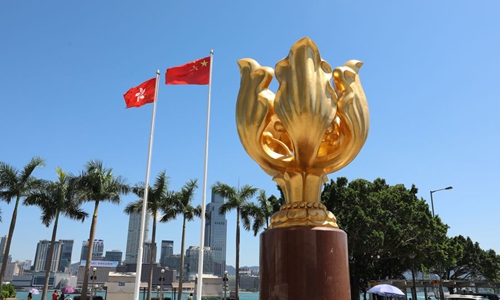
Photo taken on August 5, 2019 shows China's national flag and the flag of the Hong Kong Special Administrative Region on the Golden Bauhinia Square in Hong Kong, south China. Photo: Xinhua
More and more educational experts and observers have called on the Hong Kong education authority to strengthen supervision of its curriculum and examinations after a controversial question appeared in a recent history exam which was slammed for cultivating traitors of China.
Hong Kong experts reached by the Global Times on Sunday said the curriculum and assessment guidebook for the Hong Kong educational institutes should be reviewed and revised, the number of educational inspectors assigned by the Hong Kong education bureau to local schools should be increased, and positive-value oriented education should be higher weighted.
The proposals came following a question in the history test of the Hong Kong Diploma of Secondary Education Examination (DSE) on Thursday that asked examinees whether they agreed that Japan did more good than harm to China during the 1900-1945 period which covered the period of Japan's colonization of and invasion in China.
Such a question was as ridiculous as asking European students whether Hitler did more good than harm to Europe, said experts.
They said the materials given to students for reference implied a positive answer to the question, with no mention of China's
War of Resistance against Japanese Aggression (1931-45).The Hong Kong education bureau said Saturday that it was not aware and had not sent any of its staff members to review the history test question, rebutting an accusation that the authority knew the question before the tests began and "set up a trap to frame others."
The bureau slammed the question Thursday night, saying it "seriously hurt the feelings and dignity of people who suffered greatly during Japan's aggression."
The bureau urged the Hong Kong Examinations and Assessment Authority to follow up and rectify the question.
"The question seemingly is based on the long-advocated cultivation of critical and diverse thinking, but actually broke through the bottom line of the education," Tang Fei, a member of the Chinese Association of Hong Kong and Macao Studies and principal of Hong Kong's Heung To Secondary School (Tseung Kwan O), told the Global Times on Sunday.
The question was not a single incident, but reflected "the illness of the Hong Kong education," Chinese observers said, urging "related authorities to take actions as soon as possible."
Other experts called on Hong Kong legislators to introduce laws to strengthen supervision and review by education authorities of schools and teachers, and take back teachers' rights to edit their own textbook.
Tang said revising educational laws or banning teachers in Hong Kong from editing textbooks was not practical and necessary.
Instead, he urged Hong Kong authorities to review and revise the curriculum and assessment guidebook for Hong Kong educational institutes and "cultivate a stronger positive value of students and to increase the number of educational inspectors assigned by the education bureau to local schools."
"Hong Kong's education advocates the so-called concept of diverse values, but it leads to a pernicious area, which is nihilism of values," he said.
Issues such as the Japanese invasion of China "should never be debated," he noted.
"It is said Hong Kong's education teaches students to think critically and objectively, but with misleading materials, how can one be objective?" asked Basa Leung, a Hong Kong political commentator.
The issue of Hong Kong's education will be raised at the upcoming two sessions in Beijing, said some Hong Kong deputies to the National People's Congress (NPC) and members of the National Committee of the Chinese People's Political Consultative Conference (CPPCC) interviewed by the Global Times.
NPC deputy Chan Yung, vice-chairman of the Democratic Alliance for the Betterment and Progress of Hong Kong (DAB) and chairman of the New Territories Association of Societies (NTAS), told the Global Times that Hong Kong must educate its young people "to better understand Chinese history and national condition."
Chan said he would suggest establishing an institute that includes a certain number of Hong Kong experts in charge of such education, bringing historical relics from the mainland to exhibit in Hong Kong, and offering opportunities to Hong Kong students to participate in communications concerning China's national history and culture.




